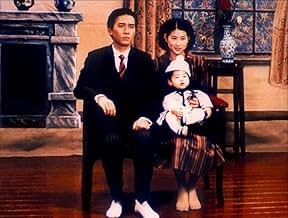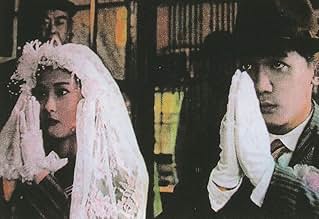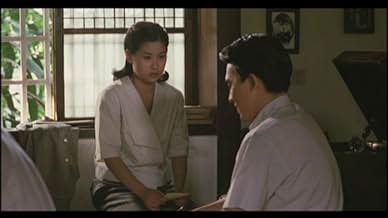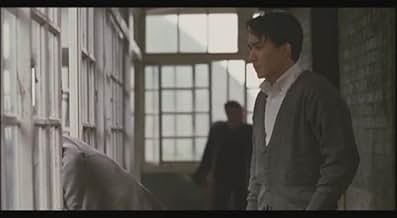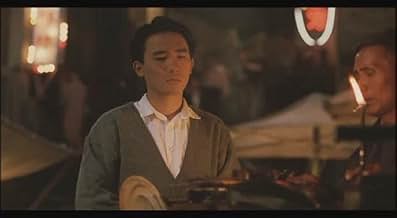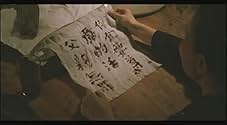Bei qing cheng shi
- 1989
- 2h 37min
CALIFICACIÓN DE IMDb
7.8/10
6.6 k
TU CALIFICACIÓN
La historia de una familia envuelta en el «Terror Blanco» que el gobierno del Kuomintang infligió al pueblo taiwanés tras su llegada de la China continental a finales de la década de 1940.La historia de una familia envuelta en el «Terror Blanco» que el gobierno del Kuomintang infligió al pueblo taiwanés tras su llegada de la China continental a finales de la década de 1940.La historia de una familia envuelta en el «Terror Blanco» que el gobierno del Kuomintang infligió al pueblo taiwanés tras su llegada de la China continental a finales de la década de 1940.
- Dirección
- Guionistas
- Elenco
- Premios
- 8 premios ganados y 6 nominaciones en total
Tony Leung Chiu-wai
- Wen-ching
- (as Tony Chiu Wai Leung)
Tien-Lu Li
- Ah-lu
- (as Tian-Lu Li)
Opiniones destacadas
This is definitely one of my all-time favorite movies. Before watching A City of Sadness, I subconsciously had this notion that somehow there were certain ways (or methods) feature narrative films should be made. Oh
how wrong I was. Experiencing this movie was like
the first time I saw Asian art, no more like the first time I tasted Chinese food as a kid. It was more than different. It was delightful! This film totally enlightened me! This poetic masterpiece changed the way I view cinema. This film which deals with modernity of Taiwan, feels more like a Confucian ritual, an ancestral rite of some sort. And at the same time like many of Hou Hsiao-hsien's other films, this movie deals with the theme of 'growth'. Hou seems to tell us over and over again that growth is learning to say goodbye to the things we love. One beautiful movie. I strongly recommend it to the cinephiles who haven't yet tasted this great cinematic treat.
10darii73
Simply one of the best films ever made and certainly the best to have come out of China, Taiwan or Hong Kong. Forget about traumatic Taiwanese history, forget about other "epic" films from mainland China, or Taiwan, or Hong Kong. This one is one of the most profound statements about human condition and the relentless power of history. You can physically feel the winds of history blowing through a small hospital in the mountains, or a house of the person who will succumb to the inevitable, or a railway car caught in the middle of a massacre. Hou Hsiao-Hsien doesn't reconstruct history, he shows you human beings caught unawares and unable to cope with a totally unexpected avalanche of events destined to change their lives. Acting is superb, the mute character played by Tony Leung Chiu Wai (who, quite prosaically, couldn't speak Hokkien and had to be made mute) will haunt you for a very long time. One of the most underrated films from one of the most underrated directors. Spend two and a half hours of your life watching this, it's worth it. 10 out of 10.
A previous poster described this film as a Taiwanese Godfather, but better. Indeed, this film has a lot similarities to godfather, in which the most notable is the condensation of an entire nation into the life of one single family. Even though I never really come to love other Hou's films, City of Sadness is a flawless epic that truthfully depict an era that is forgotten by most of my generation. I have heard those stories from my paternal grandparents, who are like people portrait in the film, grass root Taiwanese. I have also heard stories from my maternal grandparents, who are the late comers from mainland China. The entire different perspectives surprised me that in such a small nation, mistrust is still profoundly rooted and transmitted via generations. City of Sadness portraits this image so hauntingly and yet with beautiful and quiet transcendence seeing the turmoil through the eyes of the deaf and mute son of the Lin family. Taiwan, the city of sadness, is eternally sorrowful because of its rootlessness, which until today, still runs in my blood.
10kmevy
This film is definitely one of the best historical film i have ever seen!
... putting aside all those clichés most filmmakers are tend to use: there is no such thing as heroic portrayal of martyrs or the use of extremely artificial dramatic art. That makes this film believable and, compared to others, very unique.
Normally you would have a narrator who is telling you the story from his point of view. Now, i don't want to say that i dismiss this way of narration but "A city of sadness" does not need such a narrator; in fact it would shatter the special specific atmosphere of this movie if that would be the case. Without definitive narrative elements, the staging normally involves (narration/music/DP etc), the viewer gets the feeling that he is able to see for himself what the lives of those people were like when WWII ended. It is fascinating to witness how this very sober staging is still able to evoke strong emotions within the viewer. This is due to the directors vision but also to the cast which did an amazing job.
It was also very clever to have the deaf Wen-Ch'ing as the main character so the viewer can sympathize with him very easily: like Wen-Ch'ing the viewer is kind of caught up within the political turbulence and is not to able react like he would want because he is mute ... and is therefore not able to speak up in a loud voice to stop the violence. He is forced to watch.
Even today the topic Taiwan/China isn't solved at all. After watching this film people will surely get a better understanding why the struggle between China and Taiwan is so filled with anger, sadness, fury ...
so ... that's definitely a must-see!! ;)
... putting aside all those clichés most filmmakers are tend to use: there is no such thing as heroic portrayal of martyrs or the use of extremely artificial dramatic art. That makes this film believable and, compared to others, very unique.
Normally you would have a narrator who is telling you the story from his point of view. Now, i don't want to say that i dismiss this way of narration but "A city of sadness" does not need such a narrator; in fact it would shatter the special specific atmosphere of this movie if that would be the case. Without definitive narrative elements, the staging normally involves (narration/music/DP etc), the viewer gets the feeling that he is able to see for himself what the lives of those people were like when WWII ended. It is fascinating to witness how this very sober staging is still able to evoke strong emotions within the viewer. This is due to the directors vision but also to the cast which did an amazing job.
It was also very clever to have the deaf Wen-Ch'ing as the main character so the viewer can sympathize with him very easily: like Wen-Ch'ing the viewer is kind of caught up within the political turbulence and is not to able react like he would want because he is mute ... and is therefore not able to speak up in a loud voice to stop the violence. He is forced to watch.
Even today the topic Taiwan/China isn't solved at all. After watching this film people will surely get a better understanding why the struggle between China and Taiwan is so filled with anger, sadness, fury ...
so ... that's definitely a must-see!! ;)
Hou Hsiou-Hsien's "A City of Sadness" is one of Oriental Cinema's most rewarding challenges. I have returned to it several times, always with a sense of awe, understanding it a little more on each occasion but still not always sure what is actually happening on the screen. Although this makes the experience sometimes frustrating, the miracle is that it never detracts from the gut feeling I have had from the very first viewing that I am watching a masterpiece. An ambitious attempt to capture the immediate post second world war period of Taiwanese history by following the members of one family through fragments of their daily lives rather than a carefully constructed continuous narrative, Hou's work resonates with tremendous feeling. As is usual with this director, the audience has to work hard to supply connections in a film without joins, in order to understand who is who and what is actually going on. I have to admit that some of the scenes of gang violence still elude me, but, these apart, the light is beginning to shine through. It is clear that the old man with the beret who sits often staring vacantly is the owner of that densely furnished restaurant; that he has four sons. The eldest, the sturdy looking one, seems perennially mixed up with figures of a gangster underworld, the second has returned from the war mentally damaged, the third did not return from active service in the Phillipines and is presumed dead. And then there is the youngest who has a photographer's studio and seems completely apart from the rest of the family by virtue of a sensitive, gentle nature and the disability of complete deafness brought on by a childhood accident. It is his fortunes and those of the young nurse he eventually marries that provide the sense of audience empathy that even the most obscure cinema need in order to work its magic. Their scenes provide moments of great tenderness in a relationship that relies entirely for communication on the written note such as the occasion when she needs to tell him about the beauty of a German folksong that is being played. When the country is placed under repressive martial law with massed executions for dissenters we have snippets of the deaf mute's experiences. There is a particularly telling moment when he is in captivity, unable to hear the sound of the firing squad from which he somehow mercifully escapes. In "A City of Sadness" it is short scenes such as this that one remembers so vividly. That it provides the experience of a sweeping epic without recourse to any great scenes of action is both its mystery and fascination.
¿Sabías que…?
- TriviaIn 1989, Hou Hsiao-hsien's A City of Sadness, the first film to touch on the 228 Incident, a taboo subject in Taiwan, became a big hit in the theaters. As a result Jioufen, where the film was set, revived due to the film's popularity. The nostalgic scenery of Jioufen as seen in the film, as well as appearances in other media, charmed many people into visiting Jioufen. For the beginning of the 90s, Jioufen experienced a tourist boom that has shaped the town as a tourist attraction. Soon retro-Chinese style cafés, tea houses, and souvenir stores bearing the name "City of Sadness" were built.
- ConexionesFeatured in When Cinema Reflects the Times: Hou Hsiao-Hsien and Edward Yang (1993)
Selecciones populares
Inicia sesión para calificar y agrega a la lista de videos para obtener recomendaciones personalizadas
- How long is A City of Sadness?Con tecnología de Alexa
Detalles
Taquilla
- Total a nivel mundial
- USD 143,169
Contribuir a esta página
Sugiere una edición o agrega el contenido que falta

Principales brechas de datos
What is the Spanish language plot outline for Bei qing cheng shi (1989)?
Responda
